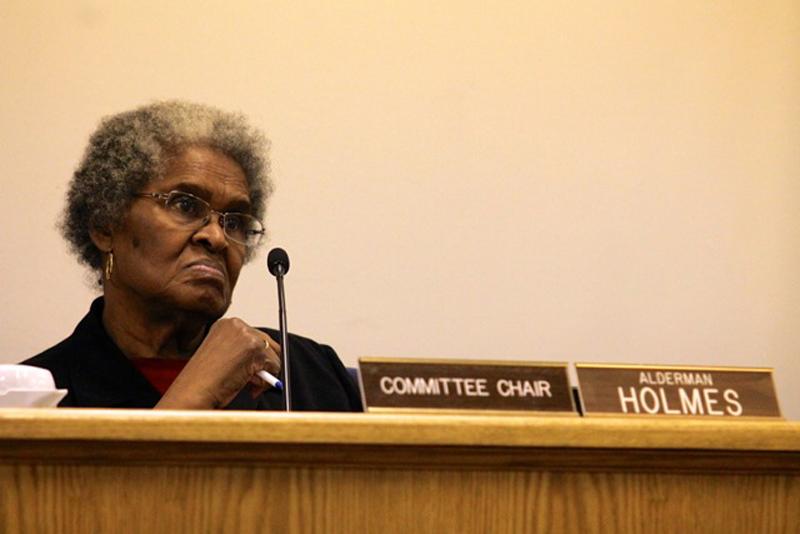Seeking community discussion, Council tables distribution of waste transfer station fees
Daily file photo by Annabel Edwards
Ald. Delores Holmes (5th) speaks at a City Council meeting. Holmes moved to hold the allocation of waste transfer station fees until a meeting was planned for impacted residents to provide input on how to spend the money.
May 24, 2016
City Council tabled allocating approximately $1.2 million in waste transfer station fees at Monday evening’s meeting because there had not been an opportunity for the impacted community to voice their concerns.
At the February 22 meeting, City Council approved a settlement with Advanced Disposal, a waste transfer station located at 1711 Church St., that allowed the city to keep all of the fees collected from the station since 2011 — approximately $1.2 million, according to city documents.
In 2010, Evanston imposed a fee of $2 per ton of waste transferred through the station. Claiming the fees were illegal, Veolia, the garbage collection service operating the center then, sued the city, according to council documents. The settlement not only allows the city to keep the money, but also allows Advanced Disposal to continue operating and the fee to be reduced from $2 to 75 cents.
City staff recommended Council return $500,000 of the settlement to the city’s general fund, with the remaining money going to capital related projects in the 2nd and 5th Wards and environmental projects, according to the documents. The costs for these projects would be assessed after City Council provides staff with direction on what actions to take.
Ald. Delores Holmes (5th) moved to hold the allocation after Kevin Glynn, chair of the city’s Environment Board, brought to attention that not enough meaningful community involvement was sought on how the funds be used prior to the Monday meeting.
“It’s only through the input from (community members) that we’ll understand what they really need, not what staff proposes and indeed not even what the environmental justice committee proposes,” Glynn said during public comment. “Please go to the groups that live right nearby, and get their thoughts and get their opinions.”
Residents in the area surrounding the station, located in the 2nd and 5th Wards, are impacted by the station’s smell and noise pollution, Holmes told the Daily. The station has caused traffic congestion and reduced business opportunities in the area, she said.
“It’s the only transfer station that we’ve been able to find in a residential neighborhood,” Holmes said. “It couldn’t happen today. Today, they wouldn’t be able to get a permit to be in a residential area. … It would be inappropriate.”
In light of how the residents have been impacted, some aldermen expressed their disapproval of allocating $500,000 to the general fund.
According to council documents, staff recommended money be deposited back into the fund given the costs the city faced during litigation and due to the “ongoing uncertainty of the State of Illinois’ financial situation.”
Ald. Brian Miller (9th) said the money collected was “impact fees” that should be used to offset negative impacts in the neighborhood hosting the station. In addition, he said he did not think the city should reimburse the general fund for supposed expenses that could have been saved if a law firm had been hired during the litigation process.
Ald. Peter Braithwaite (2nd), who seconded the motion to hold the allotment, told The Daily he wants to be able to advocate for affected residents and will work with Holmes to hold a community meeting as soon as possible. The topic will be introduced to City Council after this meeting is held.
“Hopefully we’ll be able to host that meeting where someone from our legal department will be there to explain all these various components and recommendations and see how our residents feel about it before we can move forward,” Braithwaite said.
Email: rishikadugyala2019@u.northwestern.edu
Twitter: @rdugyala822



